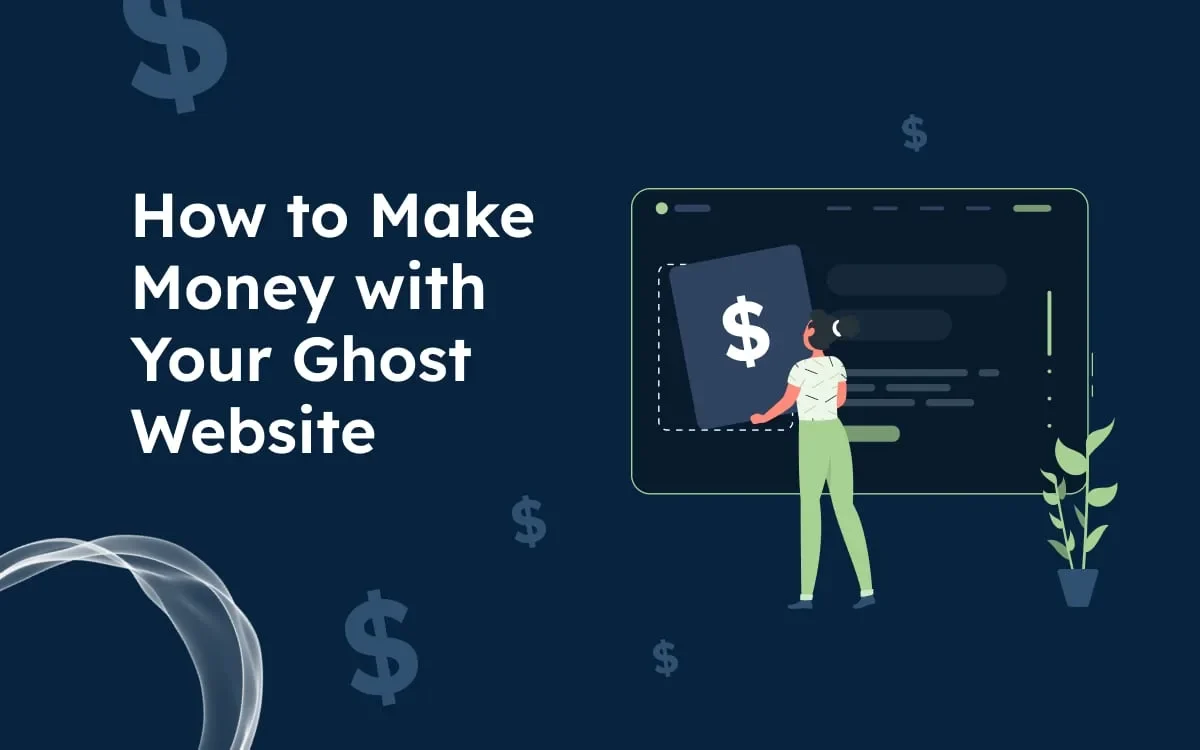Ghost is the best platform for content writers, bloggers, and publishers who want the most powerful dashboard with minimalist editors as well as the advantage of a fast web experience.
If you’re ready to monetize your content and make your membership website successful, Ghost provides the tools to create paid tiers, engage your audience, and grow your revenue effortlessly. You can make money from ghosts in multiple ways.
If you want to start making money with your ghost website, then you have to come right place. In this guide, I will tell you how to make money with the best ways on a ghost website.
Overview of the content, In this blog you will know:
- Which type of domain are you should use to monetize.
- Multiple ways to make money from ghost website.
- Monetization Tips for Your Ghost Website.
- Conclusion
- FAQs
Which type of domain are you should use to monetize

When you start your blogging on Ghost that time you need to choose your domain name to identify your website. You can create your blog on Ghost in two ways:
You can use a subdomain from Ghost: We don’t recommend any content creators or bloggers use a subdomain because it will highly affect search engine ranking. It is a very unprofessional way for your own blogging website. Here is an example of the subdomain myblog.ghost.org
You can create your own Domain: If you have enough money we highly recommend you buy a custom domain for your website. This is a very professional way and it helps you get ranked on search results.
After completing your website with setting up your custom domain, you should start creating content and writing every single day on your website.
After publishing content on your website for two or three months, it is ready now for monetization your website.
Now you make some profit from your writing. These days blogging is very competitive it will be better to have good writing, long content, and make more interactive your content.
Multiple ways to make money from ghost website

Here are some ways for you to make money from a ghost website. Which method you choose to monetize your Ghost website will depend on your niche, your audience, and your goals. However, all of these methods can be successful if you do them well.
Paid Memberships: You can offer paid memberships to your website. This gives members access to exclusive content, such as early access to new blog posts, premium downloads, or live events. To maximize revenue, consider structuring different levels of membership. You can create paid tiers in your Ghost membership site to offer varying benefits, such as exclusive articles for basic members and one-on-one consultations for premium subscribers. This approach helps increase conversions and cater to a wider audience.
This can be a great way to generate recurring revenue from your website.
Monetizing your Ghost website often starts with a payment solution. Here's a guide on how to create a Stripe account for monetization Ghost website to streamline payments. Stripe integration is crucial for monetization strategies. Also here's a step-by-step guide on how to connect Stripe to Ghost for monetization.
Optimizing your portal settings can significantly impact how effectively you convert visitors into paying members.
Customizing the portal design and showcasing tier benefits ensures that potential members understand the value of subscribing.
Google AdSense Ads: You can display Google ads on your website and earn money each time someone clicks on an ad.
This is the most common way to monetize a blog, but it can be difficult to make a lot of money this way, especially if you don't have a lot of traffic.
Here are some tips for starting Google AdSense:
- Write at least 15 unique long article
- Learning Search engine Optimization
- Add required and recommend all pages like about us, contact us, privacy & policy, terms and condition
Affiliate Marketing: You can promote other people's products or services on your website and earn a commission each time someone clicks on your affiliate link and makes a purchase.
This can be a more lucrative way to make money than advertising, but it takes time and effort to build up a successful affiliate marketing program.
From Hobby to Business: Monetization Tips for Your Ghost Website
Here are some additional tips for making money from a Ghost website:
- Create high-quality content: This is the most important thing you can do to attract visitors to your website and make money from it.
- Build an audience: You need to have a large enough audience to make a significant amount of money from your website. This takes time and effort, but it's essential if you want to be successful.
- Promote your website: You need to let people know about your website if you want them to visit it. To promote your Ghost website effectively, leverage social media platforms, guest blogging, and email marketing. Additionally, optimize your content for SEO to rank higher in search engines and drive organic traffic.
- Engagement Tools: Use engagement tools like comments to foster a loyal community. Learn how to set up Cove Comments for an interactive and engaging Ghost website. Another powerful tool is email marketing. You can send effective email newsletters in Ghost CMS to engage your subscribers and keep them informed about new content, premium offers, and exclusive insights. A well-crafted newsletter strategy can drive higher conversions and increase membership sign-ups.
- Track your results: It's important to track your results so you can see what's working and what's not. This will help you optimize your website and make more money.
Need help implementing monetization features? Learn how to find the right Ghost developer.
Conclusion
In Conclusion, monetizing ghost websites requires careful planning and strategic execution. Ghost websites can become successful online businesses by understanding the audience's potential and implementing the right monetization strategies. It is important to balance revenue generation with preserving the original content's integrity for long-term success.
FAQs
Do you have any questions about making money with your ghost website? We have answers to some frequently asked questions on the topic.
What are the different ways to monetize a Ghost website?
- Affiliate Marketing: Promote products and earn commissions through referrals.
- Advertisements: Display targeted ads for passive income generation.
- Selling Digital Products: Offer e-books, templates, or software for sale.
- Membership Services: Provide exclusive content to paying subscribers.
What is affiliate marketing, and how can I use it to generate revenue on my Ghost website?
Affiliate marketing is a strategy where you promote products or services on your ghost website and earn a commission for every sale or lead generated through your referral. To use it on your ghost website, join affiliate programs relevant to your niche, and incorporate affiliate links in your content.
Can I monetize a ghost website with Google AdSense alone?
Yes, Google AdSense may be a useful tool for monetizing a ghost website, but for best results, it's advised to combine it with other approaches.
Are there opportunities to sell products or services directly through my Ghost website?
Yes, you can sell products/services directly on your Ghost website using an e-commerce store or offer services like consulting. It gives you control over the customer experience and revenue generation.
What are some common mistakes to avoid when monetizing a Ghost website?
Common Mistakes to Avoid When Monetizing a Ghost Website:
- Overloading with Ads
- Ignoring Audience Relevance
- Lack of Transparency
- Neglecting SEO
- Ignoring Analytics
- Neglecting Mobile Optimization
- Poor Content Quality
- Ignoring Legal Considerations
- Ignoring User Feedback
- Ignoring Diversification
